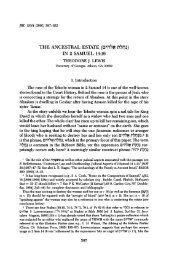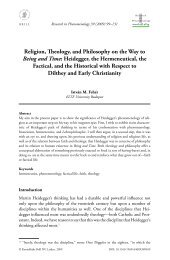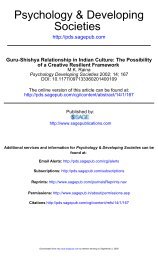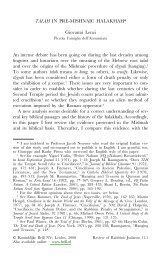- Page 3 and 4: PSYCHOLOGYOF SEXA MANUAL FOR STUDEN
- Page 5 and 6: FOREWORD TO NEW PRINTINGSo SHORT a
- Page 7 and 8: PREFACEI HAVE frequently been told
- Page 9 and 10: PREFACEsome would call it differs,
- Page 11 and 12: CONTENTSI. INTRODUCTION iII. THE BI
- Page 13: PSYCHOLOGYOF SEX
- Page 16 and 17: PSYCHOLOGY OF SEXphysiology (F. H.
- Page 18 and 19: PSYCHOLOGY OF SEXthe main a man's s
- Page 20 and 21: PSYCHOLOGY OF SEXthe change in the
- Page 22 and 23: CHAPTER IITHE BIOLOGY OF SEXThe Phy
- Page 24 and 25: PSYCHOLOGY OF SEXone way or another
- Page 26 and 27: known secretions),PSYCHOLOGY OF SEX
- Page 28 and 29: PSYCHOLOGY OF SEXBIBLIOGRAPHYF. A,
- Page 30 and 31: PSYCHOLOGY OF SEXgrasp what takes p
- Page 32 and 33: PSYCHOLOGY OF SEXStendhal called di
- Page 34 and 35: PSYCHOLOGY OF SEXblood-vessels, and
- Page 36 and 37: PSYCHOLOGY OF SEXarouses the ejacul
- Page 38 and 39: PSYCHOLOGY OF SEXcontractions of th
- Page 40 and 41: PSYCHOLOGY OF SEXwomb, may be commu
- Page 42 and 43: PSYCHOLOGY OF SEXit is so deeply an
- Page 44 and 45: PSYCHOLOGY OF SEXthey have ever sin
- Page 46 and 47: PSYCHOLOGY OF SEXtent perhapsin civ
- Page 48 and 49: PSYCHOLOGY OF SEXas the existence o
- Page 50 and 51: PSYCHOLOGY OF SEXfemale alternately
- Page 54 and 55: PSYCHOLOGY OF SEXwomen. But the lim
- Page 56 and 57: PSYCHOLOGY OF SEXmale fondled the f
- Page 58 and 59: PSYCHOLOGY OF SEXsphere, and in tho
- Page 60 and 61: PSYCHOLOGY OF SEXspecialized kind o
- Page 62 and 63: PSYCHOLOGY OF SEXpart of the kiss;
- Page 64 and 65: PSYCHOLOGY OF SEXsensitiveness of t
- Page 66 and 67: PSYCHOLOGY OF SEXIt would thus be b
- Page 68 and 69: PSYCHOLOGY OF SEXThere seems to be
- Page 70 and 71: PSYCHOLOGY OF SEXtumescence has alr
- Page 72 and 73: PSYCHOLOGY OF SEXof sexual allureme
- Page 74 and 75: PSYCHOLOGY OF SEXtendency to tears;
- Page 76 and 77: PSYCHOLOGY OF SEXcomposer's effort
- Page 78 and 79: PSYCHOLOGY OF SEXthe supreme sense.
- Page 80 and 81: PSYCHOLOGY OF SEXtimes emphasized t
- Page 82 and 83: PSYCHOLOGY OF SEXideal masculine be
- Page 84 and 85: PSYCHOLOGY OF SEXrule against the e
- Page 86 and 87: PSYCHOLOGY OF SEXbe said to have an
- Page 88 and 89: PSYCHOLOGY OF SEXhave in youth soug
- Page 90 and 91: PSYCHOLOGY OF SEXact as gross sexua
- Page 92: PSYCHOLOGY OF SEXergophily in a you
- Page 95 and 96: THE BIOLOGY OF SEXthat in choosing
- Page 97 and 98: THE SEXUAL IMPULSE IN YOUTHchildhoo
- Page 99 and 100: THE SEXUAL IMPULSE IN YOUTHhood. At
- Page 101 and 102: THE SEXUAL IMPULSE IN YOUTHBut as s
- Page 103 and 104:
THE SEXUAL IMPULSE IN YOUTHmainly f
- Page 105 and 106:
THE SEXUAL IMPULSE IN YOUTHby the n
- Page 107 and 108:
THE SEXUAL IMPULSE IN YOUTHpatriarc
- Page 109 and 110:
THE SEXUAL IMPULSE IN YOUTHdifferen
- Page 111 and 112:
THE SEXUAL IMPULSE IN YOUTHThe cast
- Page 113 and 114:
THE SEXUAL IMPULSE IN YOUTHunder th
- Page 115 and 116:
THE SEXUAL IMPULSE IN YOUTHcommon i
- Page 117 and 118:
THE SEXUAL IMPULSE IN YOUTHMead, in
- Page 119 and 120:
THE SEXUAL IMPULSE IN YOUTHuntil th
- Page 121 and 122:
THE SEXUAL IMPULSE IN YOUTHMARGARET
- Page 123 and 124:
THE SEXUAL IMPULSE IN YOUTHliar to
- Page 125 and 126:
THE SEXUAL IMPULSE IN YOUTHnever a
- Page 127 and 128:
THE SEXUAL IMPULSE IN YOUTHit as at
- Page 129 and 130:
THE SEXUAL IMPULSE IN YOUTHdreamer
- Page 131 and 132:
THE SEXUAL IMPULSE IN YOUTHof women
- Page 133 and 134:
THE SEXUAL IMPULSE IN YOUTHthose co
- Page 135 and 136:
THE SEXUAL IMPULSE IN YOUTHworld. I
- Page 137 and 138:
THE SEXUAL IMPULSE IN YOUTHMasturba
- Page 139 and 140:
THE SEXUAL IMPULSE IN YOUTHmuch les
- Page 141 and 142:
THE SEXUAL IMPULSE IN YOUTHhebephre
- Page 143 and 144:
THE SEXUAL IMPULSE IN YOUTHno serio
- Page 145 and 146:
THE SEXUAL IMPULSE IN YOUTHOn the p
- Page 147 and 148:
THE SEXUAL IMPULSE IN YOUTHculties
- Page 149 and 150:
THE SEXUAL IMPULSE IN YOUTHsexual o
- Page 151 and 152:
THE SEXUAL IMPULSE IN YOUTHceived o
- Page 153 and 154:
THE SEXUAL IMPULSE IN YOUTHrepulsio
- Page 155 and 156:
THE SEXUAL IMPULSE IN YOUTHdifficul
- Page 157 and 158:
THE SEXUAL IMPULSE IN YOUTHperhaps
- Page 159 and 160:
THE SEXUAL IMPULSE IN YOUTHin biolo
- Page 161 and 162:
CHAPTER IVSEXUAL DEVIATION AND THE
- Page 163 and 164:
SEXUAL DEVIATIONism" (or more narro
- Page 165 and 166:
SEXUAL DEVIATIONnecrophilia, or the
- Page 167 and 168:
SEXUAL DEVIATIONpre-judgments, to i
- Page 169 and 170:
SEXUAL DEVIATIONerr in attributing
- Page 171 and 172:
eighteen, which isSEXUAL DEVIATIONn
- Page 173 and 174:
SEXUAL DEVIATIONmiscellaneously cro
- Page 175 and 176:
SEXUAL DEVIATIONgence, and so to ca
- Page 177 and 178:
SEXUAL DEVIATIONinterest in sex mat
- Page 179 and 180:
SEXUAL DEVIATIONurinary interest in
- Page 181 and 182:
SEXUAL DEVIATIONas was sailing in a
- Page 183 and 184:
SEXUAL DEVIATIONunder the condition
- Page 185 and 186:
SEXUAL DEVIATIONIn many cases of fe
- Page 187 and 188:
SEXUAL DEVIATIONtempt to amalgamate
- Page 189 and 190:
SEXUAL DEVIATIONStuff-Fetichisms an
- Page 191 and 192:
SEXUAL DEVIATIONhave here the consc
- Page 193 and 194:
SEXUAL DEVIATIONhabits. He succeede
- Page 195 and 196:
SEXUAL DEVIATIONamong soldiers at t
- Page 197 and 198:
SEXUAL DEVIATIONKleptolagniaThe anc
- Page 199 and 200:
SEXUAL DEVIATIONoccurring especiall
- Page 201 and 202:
SEXUAL DEVIATIONwhom he exposes him
- Page 203 and 204:
SEXUAL DEVIATIONact of pseudo-exhib
- Page 205 and 206:
SEXUAL DEVIATIONtwo kinds of exhibi
- Page 207 and 208:
SEXUAL DEVIATIONlence. From the sta
- Page 209 and 210:
SEXUAL DEVIATIONmanifested by the e
- Page 211 and 212:
SEXUAL DEVIATIONwho isencouraged to
- Page 213 and 214:
SEXUAL DEVIATIONinconvenient, but p
- Page 215 and 216:
SEXUAL DEVIATIONThey need therefore
- Page 217 and 218:
SEXUAL DEVIATIONfestations of the a
- Page 219 and 220:
atavistic exaggerationSEXUAL DEVIAT
- Page 221 and 222:
SEXUAL DEVIATIONdanger to the commu
- Page 223 and 224:
SEXUAL DEVIATIONtraction of a fette
- Page 225 and 226:
SEXUAL DEVIATIONbeen made not by yo
- Page 227 and 228:
SEXUAL DEVIATIONas Aristotle said,
- Page 229 and 230:
SEXUAL DEVIATIONin which this may h
- Page 231 and 232:
SEXUAL DEVIATIONments. Licht, the h
- Page 233 and 234:
HOMOSEXUALITYand, as we should expe
- Page 235 and 236:
HOMOSEXUALITYless common thanhomose
- Page 237 and 238:
HOMOSEXUALITYis an encyclopedia of
- Page 239 and 240:
HOMOSEXUALITYthough I regard invers
- Page 241 and 242:
HOMOSEXUALITYthough the developed f
- Page 243 and 244:
HOMOSEXUALITYCongenital sexual inve
- Page 245 and 246:
HOMOSEXUALITYverted, but this isby
- Page 247 and 248:
HOMOSEXUALITYpolice carefully avoid
- Page 249 and 250:
HOMOSEXUALITYvestigator as true for
- Page 251 and 252:
HOMOSEXUALITYtowards the heterosexu
- Page 253 and 254:
HOMOSEXUALITYmade in the class of m
- Page 255 and 256:
HOMOSEXUALITYin a slight and undeve
- Page 257 and 258:
HOMOSEXUALITYknown person who exhib
- Page 259 and 260:
HOMOSEXUALITYHAVELOCK ELLIS, Studie
- Page 261 and 262:
HOMOSEXUALITYverts by hypnotism, ai
- Page 263 and 264:
HOMOSEXUALITYus to say that they ma
- Page 265 and 266:
HOMOSEXUALITYin the dark or with il
- Page 267 and 268:
HOMOSEXUALITYnot only sexual but co
- Page 269 and 270:
HOMOSEXUALITYtheir knowledge to inc
- Page 271 and 272:
MARRIAGEchildren, that is to say, p
- Page 273 and 274:
But it isMARRIAGEnot therefore to b
- Page 275 and 276:
MARRIAGEa significant commentary th
- Page 277 and 278:
MARRIAGEfood, cold bathing, the abs
- Page 279 and 280:
MARRIAGEphysician would do well, wh
- Page 281 and 282:
MARRIAGEdisturbance of mental balan
- Page 283 and 284:
MARRIAGEHart and Shields in Philade
- Page 285 and 286:
MARRIAGEIt is not of course only on
- Page 287 and 288:
MARRIAGEEXNER, The Sexual Side of M
- Page 289 and 290:
MARRIAGEirritations of marriage, lo
- Page 291 and 292:
MARRIAGEprise and it seems to agree
- Page 293 and 294:
MARRIAGEthe wise Montaigne, in the
- Page 295 and 296:
MARRIAGEforward from time to time.
- Page 297 and 298:
MARRIAGEand social value than the o
- Page 299 and 300:
MARRIAGEV. F. CALVERTON, The Bankru
- Page 301 and 302:
MARRIAGEnot to marry at all, alike
- Page 303 and 304:
MARRIAGEwomen. Husbands do not alwa
- Page 305 and 306:
MARRIAGEmore reliable method of att
- Page 307 and 308:
MARRIAGEthe lower animals by, for i
- Page 309 and 310:
MARRIAGEpital. The spontaneous deli
- Page 311 and 312:
MARRIAGEerted a stimulating effect,
- Page 313 and 314:
MARRIAGEand subsequent remarriage,
- Page 315 and 316:
MARRIAGEhistory have been carefully
- Page 317 and 318:
MARRIAGEmen, much commoner than is
- Page 319 and 320:
MARRIAGENervous and inexperienced m
- Page 321 and 322:
MARRIAGEthoughts out of sexual chan
- Page 323 and 324:
MARRIAGEit is usually termed, frigi
- Page 325 and 326:
glace,"MARRIAGEthe woman of "pure p
- Page 327 and 328:
MARRIAGEthe motor and impulsive ele
- Page 329 and 330:
MARRIAGEbuilt into the structure of
- Page 331 and 332:
MARRIAGEThe MenopauseThe menopause
- Page 333 and 334:
MARRIAGEactual deviations of the se
- Page 335 and 336:
MARRIAGEof a "male menopause." On t
- Page 337 and 338:
CHAPTER VIITHE ART OF LOVEThe Sexua
- Page 339 and 340:
THE ART OF LOVEbe double. In partit
- Page 341 and 342:
THE ART OF LOVEthe women who fall i
- Page 343 and 344:
THE ART OF LOVE"Virtue is love," or
- Page 345 and 346:
THE ART OF LOVEthose poetic treatis
- Page 347 and 348:
THE ART OF LOVEand unconscious chan
- Page 349 and 350:
THE ART OF LOVEother. The woman has
- Page 351 and 352:
THE ART OF LOVEnumerous qualificati
- Page 353 and 354:
THE ART OF LOVEalways been pronounc
- Page 355 and 356:
THE ART OF LOVEThe practiceVarious
- Page 357 and 358:
THE ART OF LOVEthat physiological a
- Page 359 and 360:
THE ART OF LOVEinstinct but on prin
- Page 361 and 362:
THE ART OF LOVEfication another met
- Page 363 and 364:
THE ART OF LOVEof women have orgasm
- Page 365 and 366:
THE ART OF LOVEto spread abroad mor
- Page 367 and 368:
CHAPTER VIIICONCLUSIONThe Dynamic N
- Page 369 and 370:
CONCLUSIONThe animals with primeval
- Page 371 and 372:
CONCLUSIONnot indeed measurable, it
- Page 373 and 374:
CONCLUSIONportion of the psyche to
- Page 375 and 376:
CONCLUSIONponents of the instinct,
- Page 377 and 378:
CONCLUSIONand other, seized on the
- Page 379 and 380:
CONCLUSIONnot achieved sublimation.
- Page 381 and 382:
GLOSSARYAlgolagnia. The association
- Page 383 and 384:
GLOSSARYversed sexual attitude, a m
- Page 385 and 386:
INDEXAbortion, 290.Abraham, K., 208
- Page 387 and 388:
Frigidity, 301, 332.Frottage, 43.Fi
- Page 389 and 390:
Mylitta, 38.Mysticism, 362.Nacke, 1
- Page 391:
INDEXVaginal absorption, 295.Vagini







